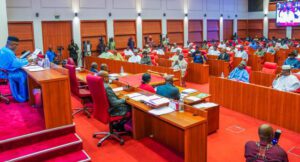“Stakeholders should create sustainable deployment models to achieve 70% broadband penetration target by 2025”- NITDA DG
…as new Broadband Plan To Deliver Data Download Speeds At A Minimum Of 10Mbps In Rural Areas
By Ibiyemi Mathew
The Director General of the National Information Technology Development Agency(NITDA),Mallam Kashifu Abdullahi has advised stakeholders in the telecommunications industry to create sustainable deployment models to achieve the 70% broadband penetration target by 2025.
Delivering a speech at a VIRTUAL STRUCTURED ENGAGEMENT WITH KEY STAKEHOLDERS IN THE NIGERIAN TELECOM & ICT SECTOR ON THE NEW NATIONAL BROADBAND PLAN 2020-2025 organized by ATCON, the DG noted that telecommunications/
Commenting on the growth of broadband in Nigeria, Kashifu said, “even though a lot has been achieved so far towards broadband penetration in Nigeria, the need for innovative models to bridge access gaps is vital.”
“Investments in the telecommunications have been slow in underserved areas due to lack of demand which will have guarantee returns on investment, but with the rising demand for internet access and broadband services as well as the persistent efforts of our Honourable Minister of Communications and Digital Economy, Dr Isa Ali Ibrahim Pantami, towards providing an enabling policy for investment, new opportunities have been created for more investments in the telecommunications sector.”
The DG noted further that NITDA is putting efforts to stimulate local demands that will further improve broadband penetration in Nigeria.
According to him, “we are implementing various initiatives aimed at facilitating the achievement of the target of 70% broadband penetration by 2025.
“Some of these initiatives includes encouraging free domain registration for public institutions and SMEs through Nigerian Internet Registration Association (NIRA), facilitating Digital Literacy Training and Awareness, Digital content creation and indigenous language translation, effective digitization of Government services (e-Government) as well as other e-services, deployment of IT intervention projects that facilitate Digital Literacy and Skills development, development of Nigeria Government Enterprise Architecture (NGEA) and Nigerian e-Govt Interoperability framework (Ne-GIF),funding capacity building & Innovation initiatives to facilitate digital jobs creation,establishment of National Center for Artificial Intelligence and Robotics (NCAIR) and establishment of National Digital Innovation and Entrepreneurship Center (NDIEC) among others.”
The new broadband plan seeks to deliver data download speeds across Nigeria at a minimum of 25Mbps in urban areas, and 10Mbps in rural areas, with effective coverage available to at least 90% of the population and penetration rate of 70% by 2025 at a price not more than N390 per 1GB of data; 2% of median income or 1% of minimum wage.
This was disclosed by the Minister of Communications and Digital Economy, Dr Isa Pantami on Thursday, 25th March 2021, at the ATCON Virtual Structured Engagement 2021while giving his address titled, “Enhancing The Contributions Of Stakeholders Towards The Nigerian National Broadband Plan Through Enabling Policies.”
Dr. Pantami reiterated that the plan targets the deployment of nationwide fibre coverage to reach all State Capitals and provision of a point of presence in at least 90% of Local Government Headquarters.
“It also targets tertiary educational institutions, major hospitals in each state and fibre connectivity at statutory rates of N145/meter for Right of Way (RoW), he said.
He further said that Broadband technology is a contributor to economic growth at several levels. It supports the development of the digital economy, consequently improving the nation’s traditional economy.
“Broadband enhances financial inclusion, security, education and is a key enabler for all the other sectors of the economy.
Pantami reiterated that in order to achieve these targets, the plan focused on recommendations in 4 focus areas, namely: Infrastructure; Policy; Demand Drivers and Funding/Incentives.




